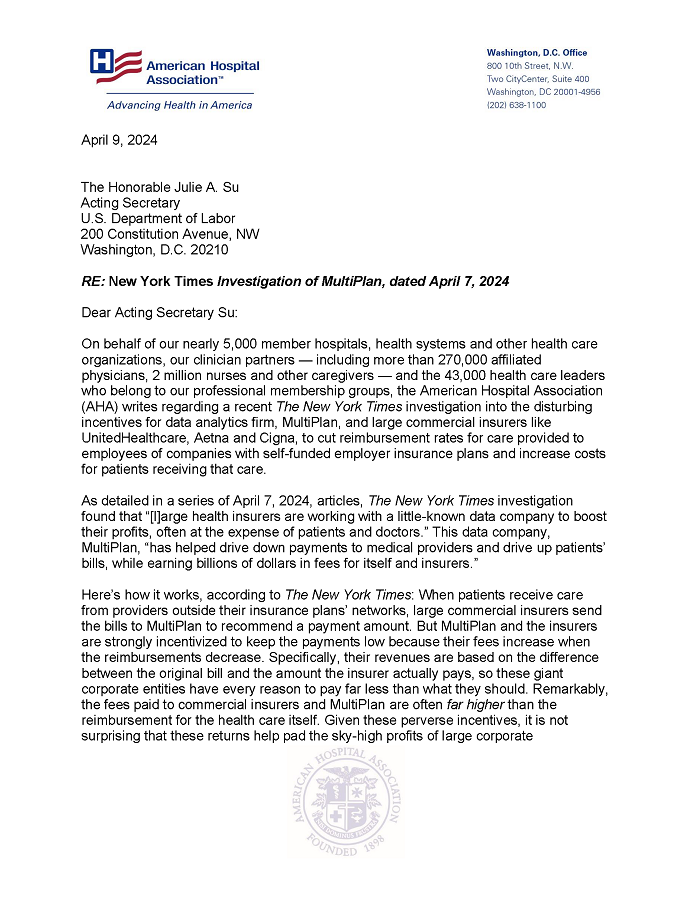

Following NYT Investigation, AHA Urges DOL to Investigate Actions of MultiPlan and Commercial Insurers
April 9, 2024
The Honorable Julie A. Su
Acting Secretary
U.S. Department of Labor
200 Constitution Avenue, NW
Washington, D.C. 20210
RE: New York Times Investigation of MultiPlan, dated April 7, 2024
Dear Acting Secretary Su:
On behalf of our nearly 5,000 member hospitals, health systems and other health care organizations, our clinician partners — including more than 270,000 affiliated physicians, 2 million nurses and other caregivers — and the 43,000 health care leaders who belong to our professional membership groups, the American Hospital Association (AHA) writes regarding a recent The New York Times investigation into the disturbing incentives for data analytics firm, MultiPlan, and large commercial insurers like UnitedHealthcare, Aetna and Cigna, to cut reimbursement rates for care provided to employees of companies with self-funded employer insurance plans and increase costs for patients receiving that care.
As detailed in a series of April 7, 2024, articles, The New York Times, investigation found that “[l]arge health insurers are working with a little-known data company to boost their profits, often at the expense of patients and doctors.” This data company, MultiPlan, “has helped drive down payments to medical providers and drive up patients’ bills, while earning billions of dollars in fees for itself and insurers.”
Here’s how it works, according to The New York Times: When patients receive care from providers outside their insurance plans’ networks, large commercial insurers send the bills to MultiPlan to recommend a payment amount. But MultiPlan and the insurers are strongly incentivized to keep the payments low because their fees increase when the reimbursements decrease. Specifically, their revenues are based on the difference between the original bill and the amount the insurer actually pays, so these giant corporate entities have every reason to pay far less than what they should. Remarkably, the fees paid to commercial insurers and MultiPlan are often far higher than the reimbursement for the health care itself. Given these perverse incentives, it is not surprising that these returns help pad the sky-high profits of large corporate conglomerates like UnitedHealthcare, Aetna and Cigna. To take just one example, UnitedHealth Group alone reportedly reaps $1 billion in annual fees from employers for its work with MultiPlan.
As a result of these secretive arrangements, America’s employees are forced to pay increasing out-of-pocket amounts — even though they already pay hundreds of dollars each month for employer-funded health insurance. Even more alarming, these harmful business practices are causing patients across the United States to cease or delay necessary treatment for fear of mounting costs. And employees are not the only ones harmed by these questionable practices. Health care providers are forced to endure these below-cost reimbursements, and employers with self-funded plans report that insurance companies are charging them unpredictable and frequently large processing fees without transparency about claims practices or data analytics, making it difficult for them to police or understand these inappropriate practices.
These practices demand government oversight — not just investigative reporting and public outrage. Unfortunately, however, The New York Times observed that “[r]egulators rarely intervene.” As the Times noted: “Enforcement primarily falls to an agency within the federal Department of Labor, which says it has one investigator for every 8,800 health plans.” The AHA appreciates that the Department of Labor has limited resources. Even so, the AHA urges the Department of Labor to immediately open an investigation into these practices and hold companies like MultiPlan and its corporate commercial insurer partners to account for these unconscionable practices, distorted incentives, potential violations of ERISA, and ultimately, harms to American patients and employees.
We thank the Department for its attention to this important matter. Please contact me if you have questions, or feel free to have a member of your team contact AHA Executive Vice President Stacey Hughes at shughes@aha.org.
Sincerely,
/s/
Richard J. Pollack
President and Chief Executive Officer


